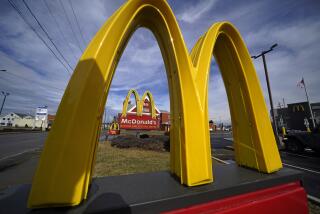E. Coli Fears Prompt IBP to Recall Beef
- Share via
The nation’s largest beef processor, IBP Inc., said Thursday that it is recalling half a million pounds of hamburger meat that may be contaminated with a deadly strain of E. coli bacteria. The move, which affects 36 states including California, is the second ground beef recall by a major U.S. processor in less than a week.
No illnesses have been reported or linked to the meat, much of which was sold in 5- and 10-pound packs to restaurants and supermarkets to repackage and sell to consumers. Because the meat is repackaged, there is no brand name, product code or lot numbers for consumers to look for.
“Any concerned consumer may want to ask at the store where they buy their ground beef whether it received any of the recalled product,” IBP said in a statement.
IBP officials believe that since the expiration date on the meat has been reached, most of it has been consumed. The meat was produced Aug. 7 at the company’s Dakota City, Neb., processing plant.
Consumer groups complain that these recalls are too late to protect consumers from illness. The E. coli 0157:H7 bacterium, the type involved in the two IBP recalls, can cause bloody diarrhea and dehydration and can lead to kidney failure in the very young, the elderly and those with weakened immune systems.
“Unfortunately, these recalls demonstrate that problems aren’t getting caught before they leave the plant,” said Felicia Nestor, food safety project director for the Government Accountability Project, a watchdog group.
It is the second hamburger recall this year for IBP. The company, which produces about 1 billion pounds of burger and trimmings a year, recalled 266,000 pounds of meat from one of its Canadian plants in April.
On Monday, Kroger Inc. announced that one of its suppliers, American Foods Group Inc., was recalling 530,000 pounds of ground beef in 17 states because of E. coli concerns. Kroger officials said they are cooperating with the recall and are examining their policies with suppliers.
These incidents are two of the larger recalls this year. However, they are much smaller than the Hudson Foods E. coli-related recall in 1997 of 25 million pounds of ground beef, after 15 people in Colorado were sickened.
An estimated 73,000 illnesses and 61 deaths are linked to this strain in the U.S. each year, according to data from the Centers for Disease Control and Prevention. California health officials said national recalls caused by E. coli 0157:H7 are averaging about five a month.
Department of Agriculture inspectors discovered the latest hamburger contamination in random samples obtained at a processing plant to which IBP had shipped the beef.
Consumer groups and USDA Inspector General Roger Viadero have urged meat processors to do more testing to isolate contaminated meat before it leaves the plant. However, the meat industry says it would rather invest its money in germ-killing processes such as irradiation and surface disinfecting.
Federal regulations do not require processors to test for this strain of E. coli at the plant. But USDA officials do randomly sample meat in plants and at wholesale and retail establishments for the deadly bacteria.
IBP spokesman Gary Mickelson said the company randomly samples carcasses at its 11 processing plants for the bacterium, which develops naturally in the intestines of healthy cattle.
Food microbiologists said they don’t believe that more deadly bacteria are ending up in food, although they acknowledge that the speed at which these large assembly lines move could make detection harder.
Instead, they said, bacterial tests are becoming more accurate, and computer systems more able to link isolated outbreaks into large epidemics.
“The appearance is that things are getting worse, when scientists are actually getting better at finding problems that have always been there,” said Jeffrey Kornacki, a microbiologist and professor at the University of Georgia.
To avoid consuming E. coli bacteria, the CDC recommends that consumers cook ground beef until a thermometer inserted into the thickest part of the patty registers 160 degrees, and never place cooked hamburger patties or other food on the same plate that held raw meat.
More to Read
Inside the business of entertainment
The Wide Shot brings you news, analysis and insights on everything from streaming wars to production — and what it all means for the future.
You may occasionally receive promotional content from the Los Angeles Times.










